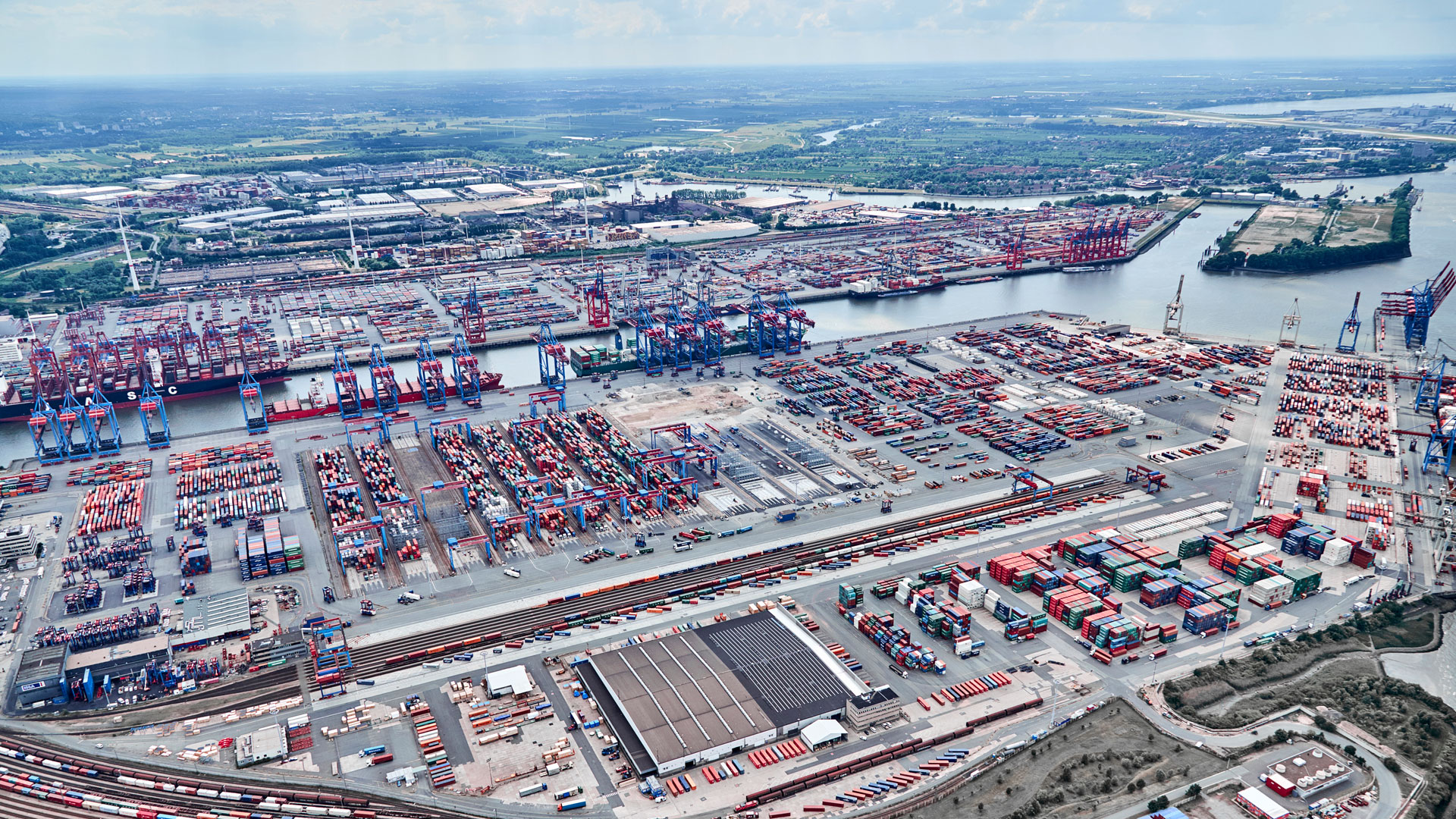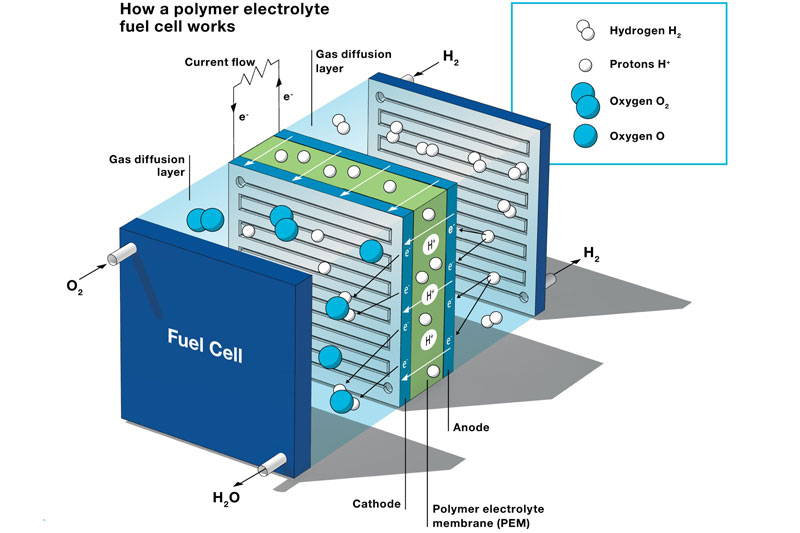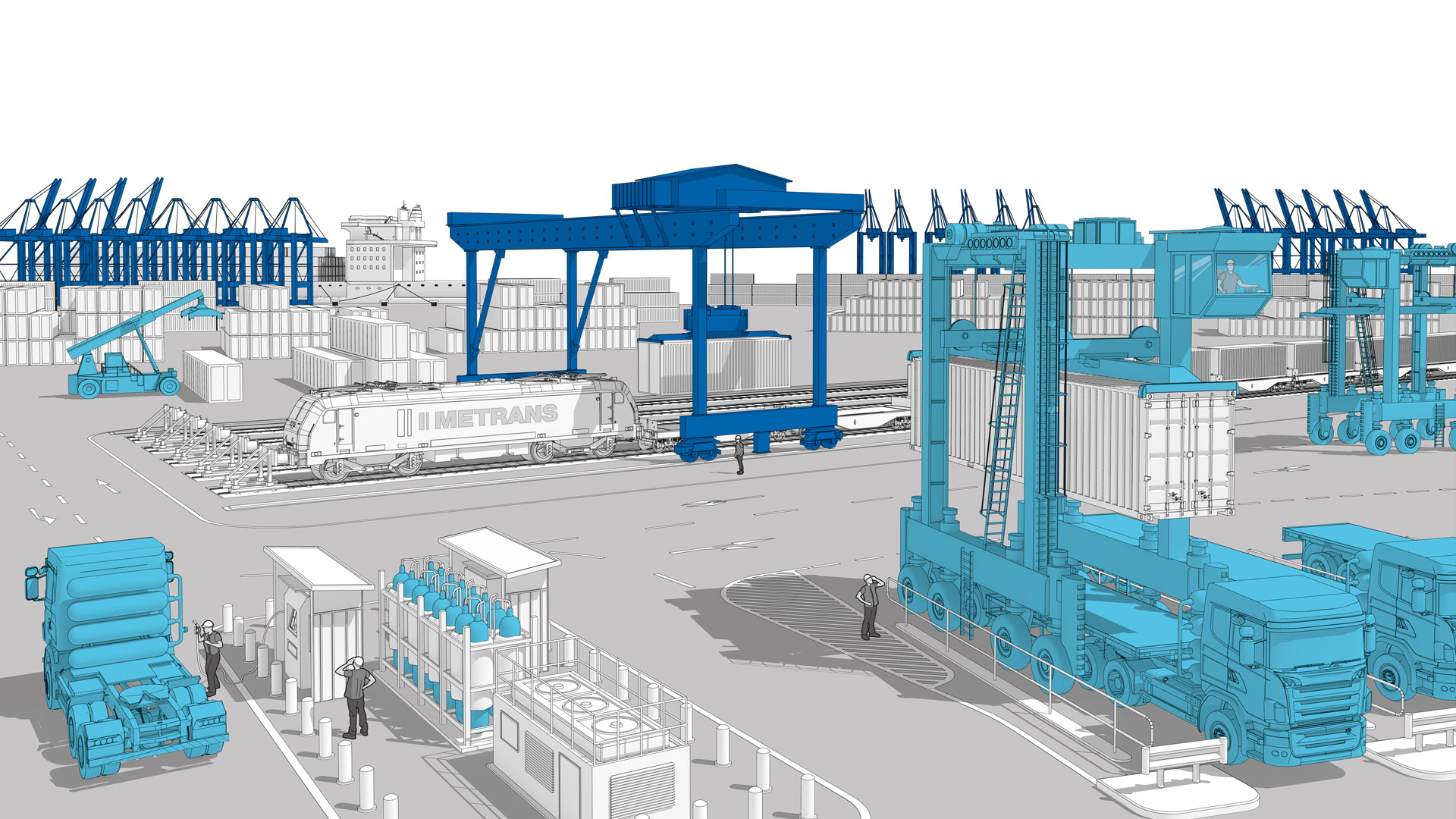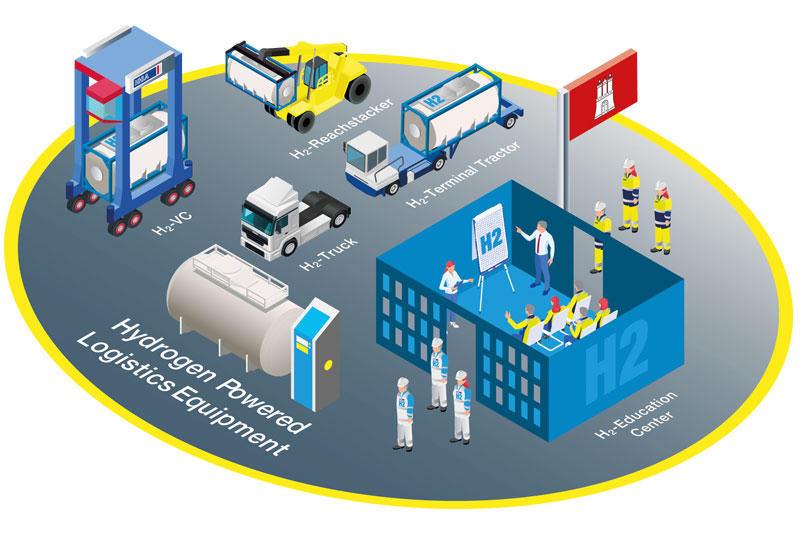Six questions to …
Our goal is to gain a deeper understanding of the needs of the partners within the Sustainable Energy Hub. This, in turn, should empower the partners to...

"Water is the coal of the future," wrote Jules Verne in his 1870 book "The Mysterious Island." Undoubtedly, water is crucial for energy supply and will assume an even more significant role in future energy production. Hydrogen, hailed as the energy carrier of the future, can be derived from water through electrolysis using renewable energies like solar or wind power. According to the German government's National Hydrogen Strategy, the use of hydrogen will revolutionise German industry as well as trucking, shipping and aviation in an environmentally friendly way. Germany aims for climate neutrality by 2045, with industries and businesses aligning their strategies accordingly.
„The hydrogen
refueling station
is expected to
start operating
in early 2024"
Hamburger Hafen und Logistik AG (HHLA) is one of them. Set on playing a pioneering role, the HHLA is aspiring to achieve climate neutrality by 2040. Through the Clean Port & Logistics (CPL) project, HHLA collaborates with around 50 participating companies, driving the practical application of hydrogen technology to enhance its market readiness. Supported by the German Federal Ministry of Transport and Digital Infrastructure within their national innovation programme for hydrogen and fuel cell technology, the cluster is accelerating the decarbonisation of handling and transport processes. The initiative also involves
testing hydrogen-powered equipment in port logistics. "Our goal is to accelerate the market readiness of hydrogen technology by applying it directly to real-world operations," says Janne Oeverdiek, manager of the Clean Port & Logistics Innovation Cluster.
For this purpose, the CPL unites container and port logistics firms, vehicle and handling equipment manufacturers, hydrogen producers, universities, and research institutes. Partners hail from various regions globally, including Europe, Asia, and North and South America. A major advantage of collaborating in the innovation cluster is the direct and personal exchange of experience and results between the partners. They engage in practical research and testing to explore how hydrogen can reliably fuel port technology and logistics. The cluster conducts simulations, analyses, and develops training and education concepts for this purpose. The focal point of these activities is a test field for hydrogen-powered equipment and port logistics at HHLA Container Terminal Tollerort (CTT) in Hamburg.


Together with Linde Engineering, HHLA is constructing a hydrogen refuelling station within the CTT test field to service hydrogen-powered heavy goods vehicles and terminal equipment and test their operations. The refuelling station is scheduled to go into operation at the beginning of 2024. At its core is an energy-efficient high-pressure ion compressor capable of compressing hydrogen to up to 450 bar. This enables efficient refuelling of equipment such as straddle carriers, empty container stackers, forklifts, terminal tractors, and trucks with hydrogen.
The first hydrogen-powered empty container stackers and terminal tractors, powered by Nuvera fuel cells, are set to be delivered by Hyster Yale Group, Inc. Delivery is scheduled to begin in the second quarter of 2024. "Moreover, several other handling equipment manufacturers - Konecranes, Kalmar, Linde, and Gassin - are interested in testing their prototypes on the test field," notes Oeverdiek. The cluster will orchestrate and analyze these tests.
All cluster companies are committed to contributing to environmental goals and supporting the energy transition with hydrogen. One notable example is Konecranes Noell from Würzburg, specializing in the development, manufacture, and servicing of straddle carriers for container terminals globally. "Konecranes is not only providing advisory support to the cluster, but also intends to collaborate with HHLA to offer practical evidence of reliable and economical decarbonized container handling using straddle carriers," states Managing Director Hubert Foltys.

Konecranes has already implemented zero-emission container handling equipment in various ports worldwide. This includes zero-emission straddle carriers and automatic guided vehicles (AGVs) at HHLA Container Terminal Altenwerder (CTA). "These vehicles are currently battery-powered, but we will now be using hydrogen as part of our cooperation in the cluster." The first hydrogen-powered straddle carrier is expected to be ready for use in the course of next year.
Several partners in the cluster have prior experience with hydrogen. Notably, Air Products, headquartered in Hattingen an der Ruhr, North Rhine-Westphalia, Germany, claims to be the world's largest hydrogen supplier and has been supplying customers in northern Germany with hydrogen from Stade for many years. Air Products aims to assist cluster companies in seamlessly and safely transitioning to hydrogen, particularly in the mobility sector, positioning itself as a pioneer in hydrogen refuelling.
BTE, based in South Korea, specializes in the production and development of hydrogen refuelling stations, deploying hydrogen fuel cells in small mobility applications. The company joined the cluster to assess the performance of its products. BTE also hopes that cluster membership will provide access to the European hydrogen market.
Fundación Valenciaport, based in Valencia, Spain, is a research, innovation, and training center. It aims to share its findings and results with the Hamburg port community, exploring opportunities to integrate hydrogen technologies into the port and maritime transport sector. Coordinating the H2PORTS project, the foundation will test a fuel cell reachstacker and a fuel cell yard tractor daily for two years at Valencia Terminal Europa, aiming to enhance the energy efficiency, performance, and safety of fuel cell port equipment.
Partners like CMR Container Maintenance Repair Hamburg, a subsidiary of Hapag-Lloyd, anticipate gaining deeper insights into hydrogen. CMR operates an empty container depot in the port and plans to utilize large hydrogen-powered equipment in the future. Participating in the cluster is expected to offer decision support for future equipment procurement and information on hydrogen refuelling. Exchange with other members is also a focal point of interest.
"The Container Terminal Altenwerder (CTA) in Hamburg has already been certified as carbon neutral," says Oeverdiek. The terminal has a high degree of automation in container handling and uses state-of-the-art technology and innovative IT systems to ensure efficient loading and unloading of large container ships. Battery-powered handling equipment is mainly used at CTA. The experience gained here will be compared with the results of hydrogen tests at CTT, for example, in order to develop a sound basis for decision-making for all companies with ambitious climate targets of their own.